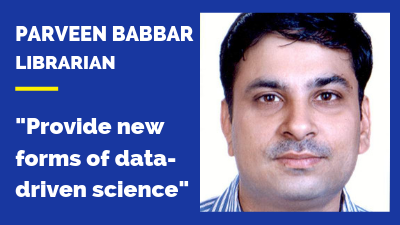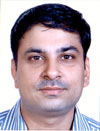First, about me: I am a deputy librarian at Jawaharlal Nehru University, Delhi, India, with 14 years of experience in my job. Now, as for JNU: It’s a premier university for research in physical and chemical sciences and mathematics. The School of Physical Sciences (SPS) of JNU is one of India’s leading departments in research/teaching in physics, chemistry and mathematics. Since JNU’s inception in 1986, its faculty have made significant contributions to these fields, as well as the interdisciplinary areas among them.
To support their activities, I helped expand the traditional role of librarians at the university to include domain information expertise in science librarianship. As part of this, I provided faculty members with e-resources in the form of e-books, e-journals, and scientific video journals. I also actively ran orientations for research support services in key subject areas.
Strengthening JNU Through Acquisitions
To further enhance faculty research, I analyzed the acquisitions that the SPS needed in the following subject areas:
Physics, including: Chemical Physics, Complex Fluids, Disordered Systems, Granular Materials, Non-equilibrium Statistical Mechanics, Materials Science, Magnetism, Superconductivity, Semiconductors, Polymers, Nano-materials and other aspects of Condensed Matter Physics. Moreover, Computational Physics, Mathematical Physics, Nonlinear Dynamics, Quantum Chaos, Statistical Nuclear Physics, Nonlinear and Quantum Optics, Neutrino Physics and String Theory are also active areas of research.
Chemistry, including: Inorganic Chemistry, Organic and Physical Chemistry (in particular on Supramolecular Chemistry), Biophysical Chemistry, Biomolecular Complexes, Synthetic Organic Chemistry, Organo-Metallics, Crystal Engineering, Ultrafast and Single Molecule Spectroscopy, and Biomolecular Dynamics.
Mathematics, including: Algebraic and Analytic Number Theory, Arithmetic Geometry, Elliptic Curves, Dynamical Systems, Probability Theory on Groups, Number Theory and Operator Algebras.
Working in Labs and Beyond
For the campus labs, I assisted the students and faculty with information technology solutions and related services. These included:
- Helping to search, plan, configure, troubleshoot, maintain and upgrade hardware and software interfaces with operating systems and more.
- Working with the faculty to provide new forms of data-driven science to support the lab experiments.
- Providing resources, such as the Cambridge Structural Database, Scifinder, RSC platform, and many more to the researchers and faculty.
- Regularly providing trials for new interfaces and databases (available through the publisher community).
- Enabling a better research environment by helping scientists improve their practices.
- Analyzing the data obtained from advanced equipment, when required.
- Supporting image processing using sophisticated instruments.
Overall, I am committed to providing the best services to researchers and faculty by identifying and visualizing patterns, anomalies and trends via data mining and analysis. I have coupled that with the ability to share the results of my analysis through the internet and web-based platforms.
Through the combined efforts of myself and my colleagues, several of our faculty members received prestigious awards and were elected fellows of renowned scientific academies.



